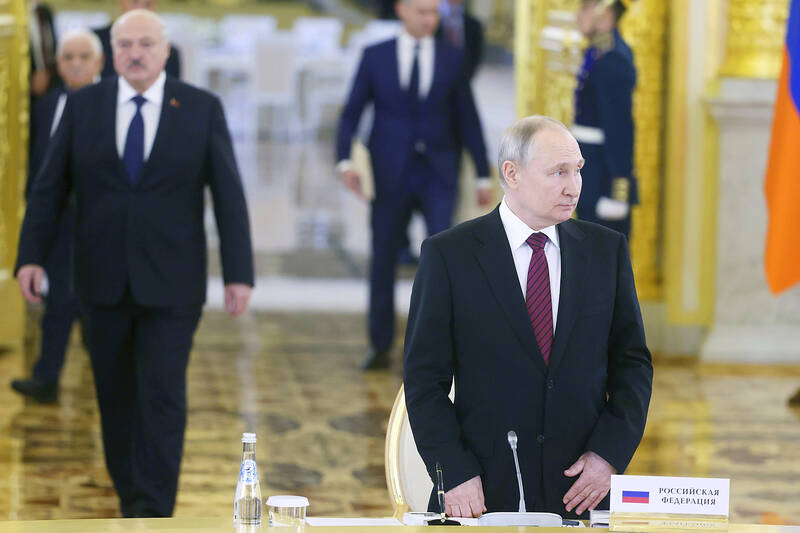Japan yesterday announced fresh sanctions against Russia over its invasion of Ukraine, targeting its military as well as the construction and engineering sectors.
Russia was hit with a wave of sanctions after it sent forces into Ukraine in February last year, but calls have grown from Kyiv and its allies for tougher action against Moscow.
The latest embargo by Tokyo follows the G7 summit Japan hosted last week in Hiroshima, where the bloc’s leaders agreed to “starve Russia of G7 technology, industrial equipment and services that support its war machine.”

Photo: AP
The Japanese sanctions include “an asset freeze of Russian individuals and groups, a ban on the export of goods to Russia’s military-related organizations, and a ban on the export of construction and engineering services to Russia,” Japanese government spokesman Hirokazu Matsuno told reporters.
The asset freeze targets 17 individuals and 78 groups, including high-level military officials, while the 80 organizations hit with export restrictions include Russian mobile phone operator MegaFon, the Japanese government said.
The US, the UK and the EU have announced fresh punishments against Moscow, as well as commitments of more military aid to Ukraine, including F-16 jets.
Matsuno also condemned plans to deploy Russian tactical nuclear weapons to Belarus.
Belarusian President Alexander Lukashenko on Thursday said that Russia had begun moving nuclear weapons to its territory, which borders the EU, ratcheting up tensions with the West over the Ukraine conflict.
“The transfer of nuclear munitions has begun,” Lukashenko told reporters in Moscow, where he met with Russian President Vladimir Putin.
In Washington, White House press secretary Karine Jean-Pierre said Russia’s move was “yet another example of making irresponsible and provocative choices.”
However, “we have not seen any reason to adjust our own nuclear posture ... nor any indication that Russia is prepared to use nuclear weapons from Belarus,” she added.
Lukashenko has allowed his territory, which borders Ukraine as well as EU and NATO members Poland and Lithuania, to serve as a staging ground for Russia’s Ukraine offensive.

The CIA has a message for Chinese government officials worried about their place in Chinese President Xi Jinping’s (習近平) government: Come work with us. The agency released two Mandarin-language videos on social media on Thursday inviting disgruntled officials to contact the CIA. The recruitment videos posted on YouTube and X racked up more than 5 million views combined in their first day. The outreach comes as CIA Director John Ratcliffe has vowed to boost the agency’s use of intelligence from human sources and its focus on China, which has recently targeted US officials with its own espionage operations. The videos are “aimed at

STEADFAST FRIEND: The bills encourage increased Taiwan-US engagement and address China’s distortion of UN Resolution 2758 to isolate Taiwan internationally The Presidential Office yesterday thanked the US House of Representatives for unanimously passing two Taiwan-related bills highlighting its solid support for Taiwan’s democracy and global participation, and for deepening bilateral relations. One of the bills, the Taiwan Assurance Implementation Act, requires the US Department of State to periodically review its guidelines for engagement with Taiwan, and report to the US Congress on the guidelines and plans to lift self-imposed limitations on US-Taiwan engagement. The other bill is the Taiwan International Solidarity Act, which clarifies that UN Resolution 2758 does not address the issue of the representation of Taiwan or its people in

SHIFT: Taiwan’s better-than-expected first-quarter GDP and signs of weakness in the US have driven global capital back to emerging markets, the central bank head said The central bank yesterday blamed market speculation for the steep rise in the local currency, and urged exporters and financial institutions to stay calm and stop panic sell-offs to avoid hurting their own profitability. The nation’s top monetary policymaker said that it would step in, if necessary, to maintain order and stability in the foreign exchange market. The remarks came as the NT dollar yesterday closed up NT$0.919 to NT$30.145 against the US dollar in Taipei trading, after rising as high as NT$29.59 in intraday trading. The local currency has surged 5.85 percent against the greenback over the past two sessions, central

US Indo-Pacific Commander Admiral Samuel Paparo on Friday expressed concern over the rate at which China is diversifying its military exercises, the Financial Times (FT) reported on Saturday. “The rates of change on the depth and breadth of their exercises is the one non-linear effect that I’ve seen in the last year that wakes me up at night or keeps me up at night,” Paparo was quoted by FT as saying while attending the annual Sedona Forum at the McCain Institute in Arizona. Paparo also expressed concern over the speed with which China was expanding its military. While the US